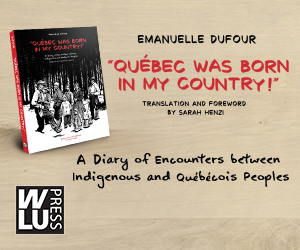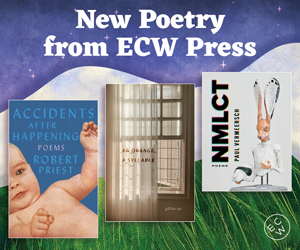Careful Inventory: a skillshare and series for emerging poets
By Leah Horlick
Dear readers,
Welcome to Careful Inventory. I am very grateful to Open Book for this residency in celebration of National Poetry Month; have you seen all the incredible company in their archives? I have ten columns coming up for you: dedicated to emerging poets, with love, and in the spirit of a safer future for us all.
By way of introduction, and in case you missed yesterday's interview: much of my published work addresses deeply personal themes of intimacy and violence. My third book, Moldovan Hotel, is officially out today with Brick Books (come to my launch tonight with Glass Bookshop!)—it’s all about the intersections of queerness, antisemitism, and Islamophobia in past and present Romania, where my great-grandparents lived. I’ve recently moved to Treaty Seven territory in Calgary for love and sunshine; I lived on unceded Coast Salish territories for nearly ten years, during which time my dear friend Estlin McPhee and I co-organized REVERB, Vancouver’s only anti-oppressive & accessible queer reading series. I’ve taught poetry to thousands of youth in Surrey, White Rock, and Langley, and I’ve led skills-based career workshops for hundreds of emerging and professional artists. Much of the work I’m proudest of sharing in these venues, and that I’m honored to share here, has little to do with "craft"—and that’s exactly why I feel so strongly about it.
My residency is devoted to emerging poets because I feel truly nauseous thinking about how (awful, no-good, horrible, curse-its-name) COVID and the loss of in-person events has limited opportunities for new writers. So much of the early mentorship I received was delivered not only in-person, but in moments that can't really be facilitated virtually: in the lineup for the bathroom at a festival, in the car on tour, or through a timely side conversation during a workshop. If you’re a poet who couldn’t make it to in-person opportunities in the first place because of your kids, your other job, the cloud of perfume over the audience, or the flight of stairs in the venue, you might have never received this kind of support in the first place. I want you to have those skills that are so often transmitted in person, in that lineup, or through a wise and loving whisper at intermission—the skills that sometimes require a dispelling of illusions about our profession, and thus are nearly impossible to share on a public Zoom call with an open group chat. I hope that Open Book & I can fill just a very small part of this gap together.
Here we are in the middle of a pandemic, working in a highly romanticized discipline, with almost non-existent material resources, while being hounded by historic stereotypes that glorify writing at the expense of all else. In this especially precarious moment for the arts, I really feel that we need a shift of focus: towards on online safety, emotional protection, economic security, and boundaries for new (and established!) writers. Behind the Instagram post, after the MFA workshop, once we’ve spent hundreds of hours on the perfect line break: how do we actually prepare ourselves for safer, more sustainable careers and lives? And for those of us who face systemic barriers to participation and success in the arts—who are perhaps being conditionally, temporarily celebrated for our identities, while simultaneously experiencing racism, ableism, and homophobia—how do we cope when they only want parts of us, and for free? It’s my hope that these posts will be useful to emerging poets of any age. That said, I ask forgiveness from elders who might not find utility in lessons from my lived experience thus far. A skillshare goes both and many ways—I look forward to learning from all of you, and with you, as we move along.
Here’s what you can expect in the coming weeks, from emotional to economic safety:
Your CanLit News
Subscribe to Open Book’s newsletter to get local book events, literary content, writing tips, and more in your inbox
- We’ll talk about boundaries and privacy on the Internet, because I have seen the abyss through working with women and youth who have faced violence and harassment online. I have also written three books of poetry about highly stigmatized topics that I talk about very publicly, and so I've had to adjust my online life accordingly.
- We’ll talk about protecting yourself at in-person poetry readings, because I am conscious that by the time we have in-person readings again, some of you may have never done one. And because years ago, I was so horrified by the way my friends and I were treated at particular readings that we started an entire series of our own. I want you to be prepared for the moments where you might wonder “Wait, is that…normal?” (Hint: it’s probably not. Or a more useful distinction: it might be common, but it’s not okay.)
- We’ll talk about money, and working outside of writing for a living, because (like many of you) I have always had to and likely always will. I have (at least) one other career in motion at any given moment; I have done crisis support, all sorts of retail, arts administration, and been a union shop steward twice. This has deeply informed my interest in our material and working conditions as writers. I have spent a lot of time confused, hopeless, and anxious about where the money was supposed to come from as a writer—and where I could afford to compromise with my other jobs, and where I couldn’t. I thought I was doing something wrong. You might, too. (Hint: you’re not.)
- I’ll share a few of my own rituals of poetic self-protection with you, because so many of us are finally being invited to tables that have had absolutely no additional preparation made for our presence. I have spent a lot of very expensive time in therapy talking about poetry when sessions were meant to be devoted elsewhere. I have some tools now that help me, and might help you. (And if these tools aren't relevant to your experience, perhaps they will inform how you treat the writers you work with.)
- And we'll be hearing from artists who aren’t writers, who have incredible skills from their own disciplines that are transferable to our context. I’ve invited a number of tremendous artists working in other mediums to share their strategies with us, and can't wait to learn from them alongside you.
I’ll see you next week for inspiration, stories from lived experience, and direct, actionable steps you can take for your whole self—not just your poet-self—during the pandemic and into our possible futures. We’ll kick it off by discussing boundaries and the Internet. Bring tea, and a notebook that you aren’t going to share with anyone. I can’t wait to feel your presence through the screen.
Oh! A parting word about the title: Careful Inventory is from a line in my new book. The piece is called The Spinoza of Market Street, after a story I love by Isaac Bashevis Singer. It’s about accepting and understanding what you’ve got to work with—what you chose, and what you didn’t. I’m very glad that you’re here to take some careful stock with me.
The views expressed in the Writer-in-Residence blogs are those held by the authors and do not necessarily reflect the views of Open Book.
Leah Horlick is a writer and poet who grew up as a settler on Treaty Six Cree Territory & the homelands of the Métis in Saskatoon, Saskatchewan. Her long-awaited third collection of poems, "Moldovan Hotel," is available now from Brick Books. Her first book, Riot Lung (Thistledown Press, 2012), was shortlisted for a 2013 ReLit Award and a Saskatchewan Book Award. Her second collection, For Your Own Good (Caitlin Press, 2015), was named a 2016 Stonewall Honour Book by the American Library Association. She is also the author of wreckoning, a chapbook produced with Alison Roth Cooley and JackPine Press. She lived on Unceded Coast Salish Territories in Vancouver for nearly ten years, during which time she and her dear friend Estlin McPhee ran REVERB, a queer and anti-oppressive reading series. In 2016, Leah was awarded the Dayne Ogilvie Prize for LGBT Emerging Writers. In 2018, her piece "You Are My Hiding Place" was named Arc Poetry Magazine's Poem of the Year. She lives on Treaty Seven Territory & Region 3 of the Métis Nation in Calgary.

